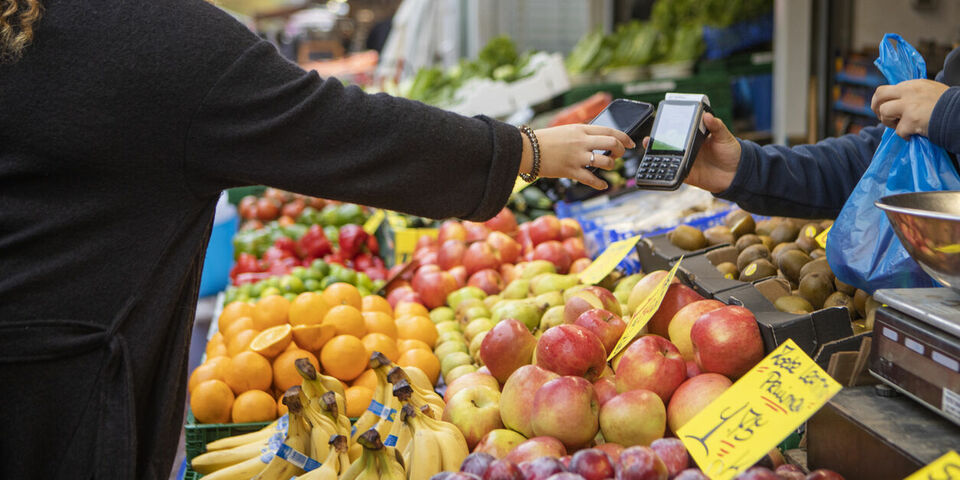New in the Netherlands: shopping
Coming from another country to study in the Netherlands, you'll be confronted with so much that's new to you. Not only your degree program but also a totally different culture with its own language and customs. With this series of articles about things that are typically Dutch, we'd like to help you settle into life in the Netherlands. This time we’ll have a look at some of the best spots for budget- and environment-friendly shopping.
GO Green Office
We’ll kick off this list with an ecofriendly spot close to home. GO Green Office is TU/e’s sustainable initiative founded by and intended for students. They present their projects in the Green Room at the Atlas building and they regularly organize sustainable events, such as circular pop-ups where students can exchange stuff they no longer use themselves. To stay posted on the projects and events, follow GO Green Office on Instagram.
Marktplaats
Marktplaats is the Netherlands’s biggest platform for buying and selling all kinds of second-hand items, from household appliances to furniture, books, and even cars. Pretty much every Dutch person has an account and now that you live in the Netherlands, you’re almost certain to buy or sell something on Marktplaats at some point. If you’re looking for a vacuum cleaner, desk chair or tableware, you’ll find cheap or even free items on Marktplaats. Do exercise caution when buying a second-hand bike, because bike thieves are also active on the platform. If the seller seems intent on hiding their identity or if the offer seems too good to be true, trust your intuition. In other words, only do business if it feels right.
Vrijmarkt
King’s Day is celebrated every year in the Netherlands on April 27 (King Willem-Alexander’s birthday). A standard part of King’s Day is the traditional vrijmarkt (‘free market’), where people sell their stuff in the street. Normally you would need a permit to do so, but not on King’s Day. Dutch people enjoy strolling around the vrijmarkt, but it’s also a great opportunity to get your hands on some nice second-hand items without breaking the bank.
Too Good To Go
Reducing food waste while going easy on the wallet? Try the Too Good To Go app. Here, restaurants and supermarkets sell food items that would otherwise end up in the dumpster, for a fraction of the original cost. You can use the app to order a ‘magic box’, whose exact contents are unknown upfront. So if you like surprises and want to cut grocery costs, waste no time in downloading the app on your phone and finding a good deal near you.
HEMA
HEMA is a Dutch department store chain with a longstanding tradition. Everybody loves HEMA, because it offers almost everything a person needs at a reasonable price: clothing, food, stationary, drugstore items, household goods, and loads more. Some products, such as the HEMA smoked sausage and the tompouce pastry, have become true icons that are emblematic of Dutch culture. And if that wasn’t enough, the typical HEMA design featuring bright colors and fun prints is hard to resist. We wouldn’t be surprised, therefore, if hopping into HEMA becomes one of your hobbies.
Het Goed
Het Goed is a Dutch thrift store chain with branches throughout the Netherlands. In Eindhoven, you can find Het Goed at Meerenakkerweg 2, where it opens Monday thru Saturday. Het Goed’s mission is to give used items a second life by reselling them. They also offer suitable employment to people with a distance to the labor market. If you have any items you would like to donate, you can ask Het Goed if they’re interested.
Vinted
When it comes to sustainable clothes shopping, Vinted is a practical app to buy and sell second-hand clothing. Fun fact: the CEO is a TU/e-alumnus. So if you feel like shopping for new clothes but you don’t have a lot to spend, why not clear out your wardrobe and sell the clothes you don’t wear any more via the app. You can use the money you make to buy new items. Nifty, right?
MUD Jeans
Who doesn’t own a pair of jeans? Unfortunately though, not a lot of people can afford the sustainably produced, good-quality kind. The founders of MUD Jeans came up with a solution for this. The Dutch brand of circular denim produces jeans made out of recycled, organic materials, which you can lease for € 9.95 a month. After twelve months the jeans are yours, to keep or send back so they can be recycled again.
Markets
Almost every city in the Netherlands organizes weekly markets where you can buy such things as flowers, fruit and vegetables, fish, cheese, herbs and spices, nuts, clothing and bike accessories. They’re often slightly cheaper in the marketplace than in regular stores, and getting them there is generally more fun. You can have a chat with the vendors and there are stalls where you can buy all kinds of yummy treats, such as kibbeling (pieces of breaded cod) fresh out of the deep fryer or a warm stroopwafel (a typical Dutch waffle cookie filled with syrup). In the center of Eindhoven there’s a textile market every Tuesday, where you can also buy fish, fruit and nuts. And every Saturday from 10 AM to 5 PM there’s a big market at the Woenselse Markt. Every Saturday you can find the Duurzame Weekmarkt (Sustainable Weekly Market) on Wilhelminaplein, a small-scale market with homemade or home-grown organic products such as pastry, fruits and vegetables, cheese and soup with bread.






Discussion